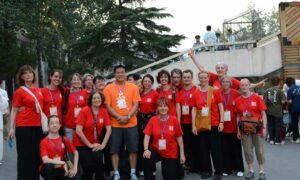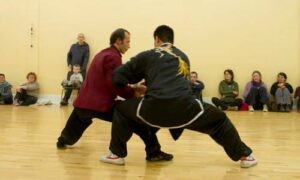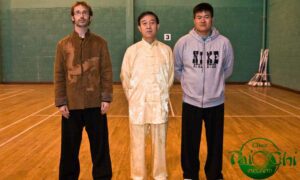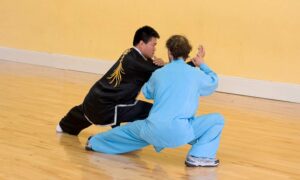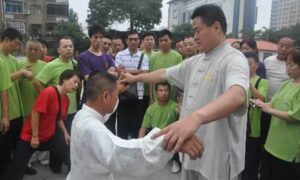Chen Taijiquan
Masters
Our Lineage
- The MastersWhile there have been many notable masters of Taiji throughout its history, above are some of the most important characters that we greatly admire for their Gong Fu, teaching and leadership skills.
Fake
Chen Fake or Chén Fākē 陳發科 (1887–1957) was a famous Chinese Taijiquan teacher.

- Chen Fake
Born and raised in Chen Family Village (Chenjiagou, 陳家溝) , he was the 17th generation lineage holder of Chen Style Taijiquan.
His great-grandfather was the famous Taijiquan Grand master Chen Changxing who formulated the lao jia yi lu and er lu from the earlier forms of Chen Wangting. Chen Fake made Chen Taijiquan a known and distinct entity when he went to Beijing at the invitation of his nephew Chen Zhaopi in 1928 and opened the Zhongzhou Institute, which taught taijiquan.
Chen Fake is also known as the creator of the so-called New Frame (xin jia) within Chen style. Chen Fake feared that taijiquan was being lost because some of its properties were too subtle, so he created a form that added visible external movements to internal actions.
Exponents are however divided over this view. His son Chen Zhaokui is among many who regard Xin Jia to be a more refined style of Chen not previously taught in public. Xin Jia is much more ornate than the so-called Old Frame style (Lao Jia) of Chen Zhaopi.
Chen Fake practiced 30 forms daily for 30 years and the martial arts circles in Beijing awarded him with a plaque saying he had the top level gong fu in China. Of humble character he put the plaque under his bed and said there is always someone better.
Of his various exploits 2 interesting stories tell of him single handedly defending the city gates of wenxian with a long pole against a group of around 80 bandits known as the red spear gang.
Another story tells how he refused to work for a certain warlord who then had his hands tied and ordered him to be attacked by a sabre.He disarmed the sabre attack just with his feet!
Zhao-Pi
A student of Chen Deng-Ke (his father), Chen Yan-Xi, Chen Pin-San, and Chen Fa-Ke.
- Chen Zhaopi
Chen Zhao-Pi (1883-1972) was a student of Chen Deng-Ke (his father), Chen Yan-Xi, Chen Pin-San, and Chen Fa-Ke. His teaching and efforts to continue the legacy of Chenjiagou Taijiquan led to the spread of Chenstyle Taiji to the world outside Chenjiagou, as well as the establishment of the Wushu Training Halls in both Chenjiagou and Wenxian.
In 1928 he went to Beijing to teach.When he arrived a journalist wrote that finally a teacher of the original Chen Style Tai Chi has brought it to the capital .This article led to an event where Chen Zhaopi received challenges over 17 days and remained undefeated after more than 200 other martial artists tried to test his skills. During this period he asked Chen Fa-Ke to come to Beijing to teach also.
After Chen Fa-Ke arrived in Beijing, Chen Zhao-Pi traveled to Nanjing. At that time, the Kuomintang was in power, and the Mayor of Nanjing invited him to come and teach a class there and he also served as an honorary coach at the famous Central Martial Arts Institute.
From 1928 to 1958, he taught Taiji outside of the village. Some of the cities he taught in were Beijing, Nanjing, Xian, Lanzhou, Luoyang, Kaifeng, and Zhengzhou. In 1958 he returned to the village. After his return visit, he realized that not very many people were practicing Taijiquan anymore, due to the stresses of the World War, and the war between the Nationalists and the Communists.
Seeing this, he became very worried that the art would eventually decline. So, he returned to his job at the Yellow River Regulatory Commission in Kaifeng and requested an early retirement. He returned home to the Spartan life of the village to recruit a group of children for serious training.
There were about thirty kids who would gather in front of his door for instruction. He would lead the class in front while his wife would be in the back, making corrections. He was very patient, and took great pains to make corrections. He was never angry . During these years, there were three years of “natural disasters” (flooding, famine, etc.) as well as the beginning of the Cultural Revolution.
During the Cultural Revolution, Taijiquan was considered to be old-fashioned, and part of old religions and superstitions. It was forbidden to promote Taijiquan at this time. Also, because he was connected to the Nationalists in Nanjing in the 1930’s, he was in a lot of trouble. During this time, if you wanted to teach or learn, it was very difficult.
Chen Ke-Sen, Chen Zhao-Pi’s son, wrote of this period: “During the Cultural Revolution, my father was persecuted and subjected to public “struggle sessions” which included having a 100 kilo weight tied around his neck and being made stand bowing while receiving abuse, but during the still of night, Chen Zheng-Lei and several others of his prized disciples secretly went to study under him. My father, demonstrating that he was not afraid of the persecution, bravely carried on with his teaching of Taijiquan.”]
Grand master Chen Zheng Lei recounts “At times, he would see his students practice seriously, and at other times, not so seriously. I know that this made him upset, but he never showed it to us. Instead, he would tell us stories to make us understand why we needed to practice with determination. He told us many stories about heroes in history whose efforts led them from obscurity to success.
He told us the story of the famous ancient musician who was the inventor of the 5-tone style of Chinese music. Because he wanted so badly to develop this music, he rubbed salt in his eyes to blind himself and rid himself of the distractions of sight and thus could focus his attentions on his hearing, and his music. He also told us of General Yueh Fei who had his mother tattoo four characters on his back that read, “give yourself wholeheartedly to your country.”
He told us these stories because he wished us to follow in the example of these heroes, and so that we would be resolute and tough in our lives. Most importantly, he made us realize that we were the future successors of the art of Taijiquan, and that we must practice continuously to live up to this responsibility. If we did not, our generation would break the tradition of instruction passed down from our ancestors. Taijiquan comes from the Chen family.
If we broke this tradition, we would not be able to stand before our ancestors, and our children would lose their martial inheritance. So, when we were very young, we were made to understand our responsibility. Regardless of how difficult our situation was at the time, we had to practice hard.
Toward the end of the Cultural Revolution, the Communist Party decided to begin to promote martial arts.As a result, my teacher’s morale and confidence improved. His teaching began to increase. He would teach with great patience. If you did not understand a movement, he would repeat it over and over for you. Not only would he explain the movement, he would also explain the principles behind it and the applications.
At that time, he was in his eighties, but he would still teach push hands. In 1972, he died. He died as a result of overwork. He took Taiji teams all over China to compete. His living conditions were not good in the village, and could not sustain the energy he expended in teaching over those years. Before his death, he taught me all of the principles, techniques, barehanded routines, weapons and push hands that he knew.
Chen Zhao-Pi has passed away, but he left a group of young people dedicated to Taiji. Teachers of the style, whether they are from Chenjiagou or not, are all in a way descended from him. He was the one responsible for promoting the art when it was in decline, and raising the next generation of teachers in the village”

Zhenglei
Chen Zheng-Lei was born in May 1949 in Chenjiagou Village, Wenxian County, Henan Province, People’s Republic of China.

- Chen Zhenglei
Chen Zheng-Lei was born in May 1949 in Chenjiagou Village, Wenxian County, Henan Province, People’s Republic of China. The son of Chen Zhao-Hai (who died a year after his son was born), he has been practicing Chen style Taijiquan for over forty years. His teachers include the famed masters Chen Zhao-Pi (with whom he lived and trained) and Chen Zhao-Kui (both his uncles), masters of the 18th generation in Chenjiagou.
He is known as “Taiji Jingang” – and regarded with Chen Xiao Wang ,his cousin ,to have the highest level skill of his generation in Chenjiagou. He received his degree in physical education from Henan University in 1985. He was twice the Taijiquan Grand Champion at the National Taijiquan Competitions, and has won over 10 gold medals at the Henan Martial Arts Competition.
In 1987 he was selected as a National Martial Arts First Class Judge, and his team won three team first places from 1989 to 1991 at the National and Henan Martial Arts Meets. He has trained many great athletes, among them the celebrated champion Master Wang Hai Jun and Ding Jie. In 1995 he was awarded the title of Da Shi [da shr] or Grand master.
Grand master Chen is the author of Chen Shi Taijiquan Xie Hui Zong (Comprehensive Taijiquan Boxing and Weapons Manual) and, “Taijiquan Nei Qi Qian Tan Yu Jing Luo Xue Shuo” (A Discussion of Internal Energy in Taijiquan and Theory of the Main and Collateral Energy Channels in the Human Body) among others. He is the author of instructional videotapes dealing with Lao jia, Xin jia, Push Hands, Weapons and Qigong.
Grand master Chen is in great demand both in China and abroad as an instructor. He has trained over 15 of the coaches for the Beijing and Wuhan Physical Education Institutes, and is an adviser to Taiji organizations in Japan, France, America, and Italy. Grand master Chen runs a school in Zhengzhou City, Henan Province, China and runs an international summer camp every august there..His first disciple Master Wang Hai Jun also teaches there when he is available and is sought after in great demand.
Grand master Chen continues to teach and lecture even though he has officially retired and is admired for his leadership skills and efforts to make Taiji´s ancient and subtle concepts understood by the Western mind and has helped in modern research by the Laboratory for Mind Body Signalling and Energy Research and Susan Samueli center for Integrative Medicine in America ,with measuring the effects of Taiji practice on the bio-energy of the human body,measured as heat,light,electrical field,blood flow and conductance of acupuncture points
Hai Jun
He has won 29 gold medals in National and international competitions and is coach of the most national champions of China.
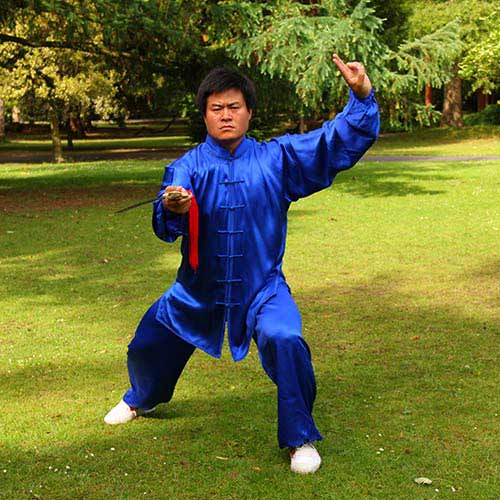
- Wang Hai Jun
Master Wang Hai-Jun was born Jan. 1972 in Zhengzhou city in Henan province. At the age of nine his father arranged for him to move to Chen Village to live and study with Grand master Chen Zhenglei. Each day before school he would train from five to seven thirty in the morning. After school he would train from four until six, frequently training again in the evening for another two hours before going to bed.
In the autumn of 1988, he gained entry to the Wuhan Physical Culture University, one of the top universities of its kind in China. He competed successfully for his university in many competitions. After graduation Master Wang Hai-Jun was assigned to the post of coach of Pingdingshan Wushu Research and Study College.
He is a senior state Wushu referee, the president and head coach of Zhengzhou Wushu Research and Study College, and coach of Henan Chen Zhenglei Taiji Culture Co., Ltd. He is an official lineage holder of Chen Style Taiji (12th generation Chen Taiji).
He has an extensive list of accomplishments in competition. In 1992 he won three gold medals in national competition, and won the championship in push-hands at the National Taiji Boxing, Sword and Push-hands Competition. In 1994 he won two gold medals in Taiji boxing and sword at the International Wenxian Taiji Championships, and he won the 80-kilo championship in push-hands at the National Wushu Championships.
He has won 29 gold medals in National and international competitions and is coach of the most national champions of China. His Gong Fu is regarded by many to be of the highest level of the new generation of Chen Style Taiji Masters. Master Wang however remains very humble and low key preferring to teach just a few select groups in America, England(where he now lives) and Ireland where he has been teaching for over 11 years at the Galway Tai Chi Academy and Limerick Tai Chi Club with a focus on achieving high standards in his students.
If you would like to host Master Wang in your city for a seminar or join one of his seminars at the Galway Tai Chi Academy contact niall.taichi@gmail.com or visit www.wanghaijun.com for a listing of all organizers and seminars internationally run by Master Wang himself and his students.

Contact
Find out more about our classes or exactly where your nearest Chen Tai Chi class is located.
our classes
Find out more about our classes or exactly where your nearest Chen Tai Chi class is located.
Feedback

"I started training 7 years ago at the Galway Tai Chi Academy under the guidance of Niall O’Floinn.
Since then I have also enjoyed the good fortune of being able to attend Shifu Wang Hai Jun’s
seminars in Galway and Limerick.
These teachers have shown great patience, have shared their knowledge, and given their time to
each student while maintaining a good-humored optimism throughout. It’s contagious!”.
Shifu
"Niall O’Floinn is a masterful Tai-Chi teacher. He guides his students with subtle grace through the intricacies of this beautiful practice." Dr. Michael Hogan (Psychologist & Author of 'The culture of our thinking in relation to spirituality'
Address
Galway Rowing Club,
10 Waterside,
Woodquay,
Galway,
Co. Galway.
Email Us
Phone
089 442 6117

